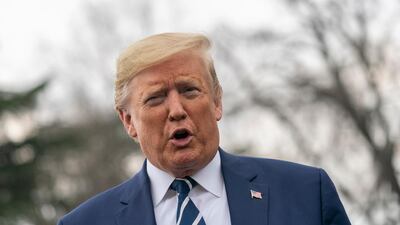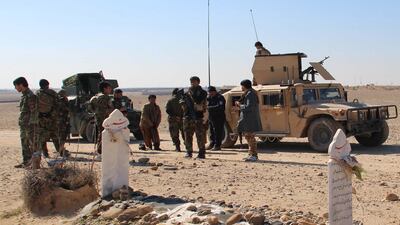US President Donald Trump said he spoke by phone with deputy Taliban leader Mullah Abdul Ghani Baradar, in what is believed to be the first direct communication between an American president and a senior official from the militant group since the outbreak of war in 2001.
Mr Trump told reporters he had a "very good talk" with Mr Baradar, head of the Taliban's political office in Qatar, and said the two sides had stressed their commitment to reduce violence in a peace agreement reached on Saturday.
The peace deal signed calls for US troop levels in Afghanistan to fall to 8,600 within 135 days, from about 13,000, and for all US forces to withdraw in 14 months if the accord holds.
In exchange, the Taliban have promised not to let the territory turn into a haven for extremists.
"We had a good conversation," Trump told reporters. "We've agreed there's no violence, we don't want violence, we'll see what happens, they're dealing with Afghanistan, but we'll see what happens."
Taliban spokesman Zabihullah Mujahid said the call lasted 35 minutes and was conducted in the presence of US envoy to Afghanistan Zalmay Khalilzad.
"You are a tough people and have a great country and I understand that you are fighting for your homeland," he quoted Mr Trump as saying.
The White House later provided a statement on the call between Mr Trump and Mr Baradar, who signed the peace accord.
In addition to urging a continuing reduction in violence, Mr Trump encouraged the Taliban to participate in talks with the Afghan government.
Soon after the call, the Taliban resumed military operations against Afghan forces across the country.
At least 20 Afghan forces were killed in Taliban attacks in two separate attacks in northern Kunduz province in the past 24 hours, said Fawzia Yaftali, a member of the Kunduz provincial council.
US forces conducted a strike against the Taliban in Afghanistan's Helmand province on Wednesday for the first time in 11 days, US military spokesman Sonny Leggett confirmed.
Taliban fighters were "actively attacking" Afghan forces in Nahr-e Saraj, when US forces took action to "disrupt" them, he wrote on Twitter, claiming that the Taliban had conducted 43 attacks against Afghan forces on March 3 alone.
"We call on the Taliban to stop needless attacks and uphold their commitments. As we have demonstrated, we will defend our partners when required," Col Legget said.
At the time of the US invasion, the Taliban ruled Afghanistan and refused to surrender Al Qaeda leader Osama bin Laden, who eventually fled to neighbouring Pakistan before being killed by US forces in 2011.
The phone call came after Mr Trump said on Saturday that he plans to meet personally with Taliban leaders "in the not-too-distant future".
“I really believe the Taliban wants to do something to show that we’re not all wasting time,” Mr Trump said. “If bad things happen, we’ll go back.”
The Doha deal – which followed a seven-day reduction in violence – is expected to pave the way towards direct talks between Taliban officials and Afghan leaders in Oslo as soon as next week.
Expected March 10, talks between the Taliban and Ashraf Ghani’s administration are at a stalemate as both sides have set conditions.
The militant group says Mr Ghani’s administration must release 5,000 Taliban prisoners, while Mr Ghani has asked the Taliban to leave Pakistan.
“If the Taliban talk prisoner release and have it as a condition, we also have conditions,” Mr Ghani told a gathering yesterday during a visit to eastern Nangarhar province. “They should tell me: when will they leave Pakistan?”





